La Bohème

|
Caitlin GotimerMimì |
"Gotimer is a force of nature on stage… Her soaring vocal range and the depth of her acting establish Juliette as the driving force of the affair." — Broadway World
This summer, Gotimer makes her European debut as Donna Anna in Don Giovanni with Deutsche Oper Berlin. She also makes her debut as the Countess in The Marriage of Figaro as a Renée Fleming Artist at the Aspen Music Festival, and she covers Musetta in La Bohème with the Bravo Vail Music Festival. Later, in the 2024/25 Season, Gotimer debuts in Pagliacci (Nedda) with Pittsburgh Opera; La fiamma (Silvana cover and La Voce) with Deutsche Oper Berlin; and La Bohème (Mimi) with Arizona Opera.
In the 2023/24 Season, Gotimer made her debut as Juliette in Gounod’s Roméo & Juliette with Arizona Opera, her Palm Beach Opera and Dayton Opera debuts as Tosca, and her Santa Fe Symphony debut as the soprano soloist in Handel’s Messiah. In the 2022/23 Season, Gotimer debuted as Tosca with Arizona Opera, made her Dallas Opera debut as Fiordiligi in Così fan tutte, and joined The Santa Fe Opera's Apprentice Program, where she covered Tosca.
In her residency with the Marion Roose Pullin Arizona Opera Studio, Gotimer made main stage debuts in Carmen (Micaëla), Così fan tutte (Fiordiligi), and A Little Night Music (Mrs. Anderssen). During her tenure as a resident artist with Pittsburgh Opera, she appeared as the title role in Handel’s Alcina, Elettra in a reimagining of Mozart’s Idomeneo, and covered Mimì in Puccini's La Bohème. With Crested Butte Opera Studio, Gotimer performed as Lauretta in Gianni Schicchi and Musetta in La Bohème. Other roles in Gotimer’s repertoire include the title role in Suor Angelica and Magda in La Rondine. In concert, Gotimer was a soloist in Mozart’s Requiem in D minor at the Festival Songe d’été en musique in Québec and Bach’s Missa Brevis in F with Binghamton University.
Gotimer won two top awards in the YPO/Florida Grand Opera Voice Competition and was the district winner of the 2022 Metropolitan Opera’s Laffont Competition. She was a semifinalist in both the 2022 Vincerò Competition and the 2020 Houston Grand Opera Eleanor McCollum Competition, a finalist in the 2020 Pittsburgh Festival Opera’s Mildred Miller Competition, the Second Prize and Audience Favorite Award winner at the 2017 Opera Guild of Dayton Competition, the recipient of the Italo Tajo Award in CCM’s 2017 Corbett Competition, and the winner of the 2015 National Biennial Collegiate Voice Competition hosted by NFMC.
Gotimer holds a Master of Music degree from the University of Cincinnati College-Conservatory of Music and she received her Bachelor of Music in Voice from Binghamton University.

|
SeokJong BaekRodolfo |
SeokJong Baek has continued to draw international attention following his Royal Opera House debut as Samson in Richard Jones’s new production of Saint-Saëns' Samson et Dalila and is fast establishing himself as an artist of note, winning widespread praise for his arresting lirico/spinto sound and refined technical accomplishment.
Baek’s critically acclaimed portrayal of Samson was not only a house and role debut, but also his professional debut as a tenor, having transitioned from baritone over the coronavirus lockdown period. As a baritone, he was an Adler Fellow and a member of the Merola Programme at the San Francisco Opera, as well as a former resident artist of the Lyric Opera of Kansas and an alumnus of the Manhattan School of Music.
Highlights of the 2024/25 Season includes Cavaradossi in Tosca for The Metropolitan Opera, Cavaradossi & Calaf in Turandot for the Royal Opera House, Covent Garden and Radamès in Aida for the Deutsche Oper Berlin. Additionally Baek makes his role debut as Rodolfo in La Bohème at Arizona Opera and returns to the Teatro del Maggio Musicale Fiorentino.
Last season, Baek made his much-anticipated Metropolitan Opera debut as Ismaele Nabucco, returning later in the season as Calaf Turandot. Other recent highlights include role debuts as Pinkerton in Madama Butterfly, Radamès in Aida & Turiddu in Cavalleria Rusticana at the Royal Opera House, a house debut at Teatro San Carlo as Calaf and role debut as Cavaradossi in Tosca with Arizona Opera.
On the concert platform, Baek recently made professional debuts with the Accademia Nazionale di Santa Cecilia conducted by Sir Antonio Pappano in Verdi's Requiem, as well as with the Royal Danish Orchestra conducted by Bertrand de Billy. Other highlights include festival debuts at the Lanaudière Festival in a concert performance as Radamès in Aida conducted by Yannick Nézet-Séguin, and at the BBC Proms in Verdi's Requiem at the Royal Albert Hall, as well as appearances with the Orquesta Filarmónica de Gran Canaria, alongside Elīna Garanča and conducted by Karel Mark Chichon.
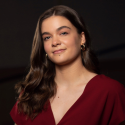
|
Emma MarhefkaMusetta |
Emma Marhefka, soprano, has country-wide performance credits including Lauretta (Gianni Schicchi) Opera Tampa, Younger Alyce (Glory Denied) Knoxville Opera and Opera Roanoke, and Frasquita (Carmen) Des Moines Metro Opera. She has been a young artist with Des Moines Metro Opera, Wolf Trap Opera, and Santa Fe Opera as cover for Adina (The Elixir of Love). While at CCM, Marhefka sang Susanna (The Marriage of Figaro), Mary Johnson (Fellow Travelers), The Vixen (The Cunning Little Vixen), and Sandrina (The Secret Gardener). She is a winner of The Metropolitan Opera’s 2025 Laffont Competition and a 2023 finalist in Houston Grand Opera’s Eleanor McCollum Competition.

|
Benjamin TaylorMarcello |
Baritone Benjamin Taylor begins the 2023/24 Season with a return to Opera Philadelphia for Simon Boccanegra (Paolo). Other season engagements include debuts with Austin Opera for Pagliacci (Silvio), The Princeton Festival for Così fan tutte (Guglielmo), and returns to The Metropolitan Opera for Carmen (Moralès), Detroit Opera for Breaking The Waves (Jan), and Bayerische Staatsoper for La fanciulla del West (Bello). He will also debut with Symphoria and Northwest Florida Symphony in Carmina Burana.
Last season he debuted at Boston Lyric Opera in La Bohème (Schaunard) followed by debuts with Bayerische Staatsoper for La fanciulla del West (Bello), OperaDelaware/Opera Baltimore for La traviata (Germont), and Opera Philadelphia for La Bohème (Schaunard). He returned to The Metropolitan Opera for The Magic Flute (Papageno) and Dialogues des Carmélites and Berkshire Opera Festival for La Bohème (Marcello). On the concert stage he will made his debut with The Cleveland Orchestra in La fanciulla del West (Bello).
Recent engagements include his debut at The Metropolitan Opera in Fire Shut Up in My Bones (Chester) followed by debuts with Michigan Opera Theatre and Spoleto Festival USA in La Bohème (Schaunard), Cincinnati Opera for the World Premiere of Castor and Patience (West), North Carolina Opera for Sanctuary Road (William Still), Baltimore Concert Opera for Adriana Lecouvreur (Michonnet), and a return to Pittsburgh Opera for The Magic Flute (Papageno). Additionally, he workshopped Factotum (Garby) at the Lyric Opera of Chicago.
Past highlights include a visit to Opera Theatre of Saint Louis for Opera on the Go – Digital followed by debuts with Fargo-Moorhead Opera for The Barber of Seville (Figaro), Opera Orlando for The Secret River (Augustus), and Des Moines Metro Opera for Pique Dame (Tomsky), Platée (Satyre), and Fellow Travelers (Tommy McIntyre).
Taylor is a graduate of the Pittsburgh Opera Resident Artist Program where some of his assignments included La Bohème (Schaunard), Glory Denied (Older Thompson), and Tosca (Sciarrone). He debuted at Madison Opera in I pagliacci (Silvio) and was an Apprentice Artist at The Santa Fe Opera where his assignments included covering in Les pêcheurs de perles (Zurga). As a Gerdine Young Artist and Richard Gaddes Festival Artist at Opera Theatre of Saint Louis where he seen in The Barber of Seville (Fiorello), Shalimar the Clown (Cowardly Giant), and Madam Butterfly (Prince Yamadori) and covered in The Barber of Seville (Figaro), La Bohème (Marcello), Ariadne auf Naxos (Music Teacher), Madam Butterfly (Sharpless), and The Trial (Lawyer Huld). Additional performances include La Bohème (Marcello) with Crested Butte Festival and Madama Butterfly (Prince Yamadori) for Berkshire Opera’s inaugural season.
Taylor received his Master of Music from Boston University and his Performer’s Certificate with Boston University’s Opera Institute. While at BU, he performed in A Midsummer Night’s Dream (Demetrius), Così fan tutte (Guglielmo), La Tragédie de Carmen (Escamillo), Angels in America (Prior Walter), Florencia en el Amazonas (Alvaro), Owen Wingrave (Coyle), and Le Portrait de Manon (Des Grieux). He received his Bachelor of the Arts at Morgan State University where he sang in Blue Monday (Tom) with the Baltimore Symphony Orchestra.

|
Peter BarberColline |
Peter Barber is an American bass-baritone and graduate of the prestigious Academy of Vocal Arts. He is currently a member of the Marion Roose Pullin Arizona Opera Studio, where he has performed Basilio in The Barber of Seville, Capulet in Roméo & Juliette, and Masetto in Don Giovanni.
Before returning for a 2nd year with Arizona Opera, Barber joined the Renée Fleming Studio at the Aspen Music Festival, performing the bass role in Matthew Aucoin’s World Premiere of Music for New Bodies, Simone in Gianni Schicchi, and Antonio in The Marriage of Figaro, all while having the great opportunity to work one-on-one with Renée Fleming throughout the summer.
Prior to joining the Arizona Opera Studio, Barber spent a 2nd summer at the Music Academy of the West, performing Colline in La Bohème under the baton of Daniela Candillari. While at AVA, Barber performed numerous roles, including; the title role in Don Giovanni, Schaunard in La Bohème, and Gremin in Eugene Onegin. In the summer season of 2022, he joined the Apprentice Program at The Santa Fe Opera, covering Fiorello in The Barber of Seville. In October of 2021, he made his professional role and company debut with Salt Marsh Opera, performing Escamillo in Carmen. Some of Barber’s other role highlights include: Bottom in A Midsummer Night's Dream, Figaro in The Marriage of Figaro, Stobrod/Blindman in Cold Mountain, Sarastro in The Magic Flute, and both Don Alfonso and Guglielmo in Così fan tutte.
Outside of the opera world, Peter has grown a substantial audience on YouTube, surpassing 190,000 subscribers via videos with in-depth musical analysis of contemporary music, as well as creating non-operatic musical covers. He is also one of the founding members of an award-winning musical group called The Bass Gang, which was formed during the pandemic, and consists of four bass singers that collaborate virtually from all over the world. They have released three EPs, as well as numerous singles, amassing over 15 million views/streams between YouTube and Spotify alone.
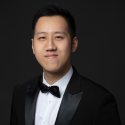
|
Yichen XueSchaunard |
Yichen Xue is a baritone from Anshan, China. In 2023, he was the recipient of Opera Index Competition’s Emerging Artist Award and, subsequently in 2024, received a Career Bridges grant. Xue was also a 2024 finalist and grant winner in the renowned Gerda Lissner Competition. Xue graduated from the Manhattan School of Music and received his Master’s degree from Hunter College, where he was a student of Ron Raines. In summer of 2024, he joins Wolf Trap Opera as a Studio Artist, followed by a residency with Arizona Opera as a Marion Roose Pullin Studio Artist where he will make his company debut as Schaunard in La Bohème.
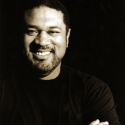
|
Gordon HawkinsBenoît / Alcindoro |
Gordon Hawkins is critically acclaimed throughout the world for his in-depth interpretations and lush baritone voice. A dramatic baritone with an international reputation as a “Rigoletto specialist,” Hawkins has delighted audiences as the tragic Verdi underdog in more than 200 performances, most recently with the Deutsche Oper am Rhein, Vancouver Opera, Washington National Opera, Arizona Opera, and Opera Colorado. He is now earning critical acclaim as a Wagner specialist: “Alberich was superbly realized by baritone Gordon Hawkins, in his [Los Angeles Opera] début. Despite wearing a grotesque puppet head and clunky boots that hobbled his movements, Hawkins delivered a sterling vocal characterization of the power-mad Nibelung.” (Opera News). He has been engaged as Alberich in Wagner’s Der Ring des Nibelungen at esteemed international companies including San Francisco Opera, Los Angeles Opera, Seattle Opera, Washington National Opera, Deutsche Oper Berlin, Teatro de la Maestranza de Sevilla, and the BBC Orchestra at Royal Albert Hall in London.
Last season saw Hawkins return to the Lyric Opera of Chicago for the World Premiere of Proximity, a project he assisted in creating during its workshop, as well as perform the role of Tonio in Pagliacci with San Antonio Opera. This season, Hawkins makes his role début as Alphonse in Frankenstein with Arizona Opera and joins New Orleans Opera to reprise his Reverend in Blue.
In recent seasons, Hawkins performed the role of the Reverend in the World Premiere of Jeanine Tesori and Tazewell Thompson’s Blue at the Glimmerglass Festival, which was received to rave reviews. He also recorded the piece with Washington National Opera, which was released in March of 2022, with critic Ralph P. Lock saying, “The one big name in the cast is Gordon Hawkins, a world-renowned Porgy, Rigoletto, and Alberich, who here establishes a rock-solid presence as The Reverend." He reprised the role in the 2021/22 Season with Detroit Opera, Toledo Opera, Pittsburgh Opera, and Seattle Opera.
Hawkins’ career is shaped by performances of opera’s most popular baritone roles at leading companies throughout the world. With an impressive repertoire under his belt, some of his prominent roles include Amonasro in Aïda which he has performed with Lyric Opera of Chicago, Washington National Opera, Houston Grand Opera, Seattle Opera, Cincinnati Opera, Detroit Opera, and The Atlanta Opera; Scarpia in Tosca which he has performed with Cincinnati Opera, Lyric Opera of Kansas City, Vancouver Opera, Portland Opera, and Arizona Opera; as well as title roles such as Nabucco with Seattle Opera and Opera Carolina and Macbeth also with Seattle Opera. Additional favored engagements have included Thoas in Iphigénie en Tauride with Metropolitan Opera; The Warden in Dead Man Walking with Lyric Opera of Chicago; Alvaro in Florencia en el Amazonas with Los Angeles Opera; Alfio in Cavalleria rusticana with Washington National Opera; Count di Luna in Il trovatore with Seattle Opera; Tonio in Pagliacci with Arizona Musicfest; and Renato in Un ballo in maschera with New Orleans Opera and Opéra de Montréal.
Internationally, Hawkins has performed at venues such as Deutsche Oper Berlin as Telramund in Lohengrin, Teatro de la Maestranza in Seville as Caspar in Der Freischütz, and New National Theatre Tokyo as the Villians in Les contes d’Hoffmann.
One of his signature roles, Porgy in Gershwin’s Porgy and Bess has brought him to some of the most esteemed companies and symphonies in the world, including The Lyric Opera of Chicago, Washington National Opera, Seattle Opera, Detroit Opera, Dallas Opera, Cincinnati Opera, Toledo Opera, Colorado Symphony, San Francisco Symphony, San Francisco Opera, Jacksonville Symphony, Festspillene i Bergen in Norway, and the Sinfonieorchester St. Gallen.
An accomplished concert artist, some favorite engagements of recent seasons include a Gala Concert for Justice Ruth Bader Ginsberg in Washington DC; a recital entitled War and Remembrance at The Clarice Center for the Performing Arts; Amonasro in Aida with St. Louis Symphony; Vaughan Williams’ A Sea Symphony with The Washington Chorus at the Kennedy Center; the world première of Jake Heggie’s A Great Hope Fell with the Eos Orchestra of New York; Beethoven’s Symphony No. 9 with The Atlanta Symphony and St. Louis Symphony; concert selections from American musicals with Welle WDR 4 in Cologne, Germany; and additional repertoire with the Chicago Symphony, National Symphony, the Baltimore Symphony, The Cincinnati Orchestra, National Theatre Orchestra of Prague, and Vienna Symphony.
Hawkins has been heard on the Live BBC Radio broadcast as Alberich in Götterdämmerung with the BBC Symphony Orchestra at the Royal Albert Hall and “Live from the Metropolitan Opera” broadcasts earlier in his career as Marcello in La Bohème with Plácido Domingo and Mirella Freni, and Silvano in Un ballo in maschera with Luciano Pavarotti and Aprile Millo. He can be heard as George Milton on the first recording of Carlisle Floyd’s Of Mice and Men with the Houston Grand Opera on Albany Records and the recording of Simon Boccanegra as the title role with the New Zealand International Festival of the Arts.
Hawkins was a winner of the Metropolitan Opera National Council Auditions and the Luciano Pavarotti International Vocal Competition and was awarded the Washington National Opera’s “Artist of the Year” award.

|
Steven OsgoodConductor |
This summer, Steven Osgood begins his eighth season as General and Artistic Director of the Chautauqua Opera Company. In addition to conducting a performance of Humperdinck’s Hansel and Gretel, he leads Love and Longing by the Lake, a trio of chamber operas that includes two World Premieres.
During the 2024/25 Season, Osgood returns to The Metropolitan Opera to lead a performance of Tesori/Brant’s Grounded and serves as Assistant Conductor for Heggie’s Moby Dick. In the winter he travels to Arizona Opera for his house debut, conducting performances of La Bohème.
Maestro Osgood made his anticipated Metropolitan Opera debut during the 2023/24 Season, conducting two performances of Jake Heggie and Terrence McNally’s Dead Man Walking. He also joined the company as Assistant Conductor for The Hours, and workshopped Lincoln in the Bardo with Opera Fusion.
Osgood’s engagements for the 2022/23 Season included a return to The Metropolitan Opera for La Traviata, Missy Mazzoli’s Proving Up at The Juilliard School, Ainadamar at University of Houston, and Street Scene at Rice University. The previous season saw rescheduled performances of Ricky Ian Gordon and Lynn Nottage’s highly successful Intimate Apparel at Lincoln Center Theatre, and he joined The Metropolitan Opera for their acclaimed production of Akhnaten.
Most recently, Osgood has collaborated with The Metropolitan Opera and Opera Memphis for workshops of new operas, continued his collaboration with Washington National Opera for their American Opera Initiative, bringing As One to Merkin Hall, and made his L’Opera de Montreal debut with the first revival of JFK by David T. Little and Royce Vavrek. He also joined the Prototype Festival for the World Premiere of Blood Moon, and led both The Flood and The Turn of the Screw at Opera Columbus.
In his role at Chautauqua Opera, Osgood has led productions of Sweeney Todd, La Tragédie de Carmen, The Ghosts of Versailles, Thompson’s The Mother of us All, Tosca, The Barber of Seville, Monteverdi’s Orfeo in Respighi’s realization, Don Pasquale, Hydrogen Jukebox, Don Giovanni, Candide, As One, and La Traviata, amongst others. He also pioneered Opera Invasion, the company’s multi-year audience development initiative. Maestro Osgood regularly shares his talent and expertise with emerging artists outside of his work at Chautauqua, having recently worked with students at Rice University, conducting Taking Up Serpents and Proving Up, and Juilliard Opera for The Turn of the Screw.
In previous seasons, Osgood conducted the World Premieres of Breaking the Waves at Opera Philadelphia, JFK at Fort Worth Opera, The Scarlet Ibis, Thumbprint, and Sumeida’s Song for the PROTOTYPE Festival, as well as Missy Mazzoli’s Song From the Uproar with Beth Morrison Projects. He was the 2017 Conductor Mentor for Washington National Opera’s American Opera Initiative, conducting the premieres of Adam, Lifeboat, and What Gets Kept. Other notable productions include the critically acclaimed World Premiere of Xenakis’s Oresteia at the Miller Theater, Tan Dun’s Marco Polo with De Nederlandse Opera, La Traviata and La Bohème with Edmonton Opera; The Ballad of Baby Doe, Peter Grimes and Tosca at Chautauqua Opera; Glory Denied, The Rape of Lucretia, Bon Appetit! and This Is the Rill Speaking with Opera Memphis; Three Decembers at Atlanta Opera; Dead Man Walking at Lyric Opera of Kansas City; The Long Walk at Utah Opera; Tosca at Hawaii Opera Theater, Stephen Schwartz’s Seance on a Wet Afternoon and Massenet’s La Navarraise with New York City Opera, Philip Glass’ Hydrogen Jukebox at Fort Worth Opera, Conrad Susa’s Transformations and Jonathan Dove’s Flight at Juilliard Opera, Lee Hoiby’s Summer and Smoke and Virgil Thomson’s The Mother of Us All at Manhattan School of Music, and John Corigliano’s The Ghosts of Versailles at both Northwestern University and Manhattan School of Music.
His concert work included appearances with the Kitchener-Waterloo Symphony featuring Tony Award nominee Louise Pitre. He also conducted workshops of two new operas in development: Herschel Garfein’s Rosenkrantz and Guildentern are Dead, and Conrad Cummings’ The Golden Gate, as well as readings of Missy Mazzoli’s Song from the Uproar and Anthony Davis’ Revolution of Forms with New York City Opera’s VOX 2010.

|
Mo ZhouStage Director |
Mo Zhou is a Chinese expatriate stage director whose boundary-pushing work has made her a distinctive voice in opera and theater. Her productions have appeared at Staatsoper Unter den Linden, Elbphilharmonie, and the National Centre for the Performing Arts in Beijing, China.
In the 2025/26 Season, she returns to Houston Grand Opera to direct the Butler Studio Showcase and revive her acclaimed children’s opera The Big Swim. She leads a new co-production of Madama Butterfly with Calgary Opera, Arizona Opera, and Opera Grand Rapids, where she also directs Byron Au Yong’s Stuck Elevator and serves as Guest Artistic Director. Additionally, she makes her debut with Opera Colorado directing Madama Butterfly.
In 2024/25, Zhou directed the Butler Studio Showcase at Houston Grand Opera, revived her acclaimed Madama Butterfly with Florentine Opera and Kentucky Opera, staged Così fan tutte at The Juilliard School, La Bohème at Arizona Opera, and returned to Virginia Opera for a new production of Così fan tutte. She also made her Canadian directing debut with Madama Butterfly at Vancouver Opera.
Her 2023/24 Season featured the World Premiere of The Big Swim at Houston Grand Opera and Asia Society Texas Center, a reimagined Madama Butterfly set in post-WWII Allied-occupied Japan at Virginia Opera, Tosca with the Kalamazoo Symphony Orchestra, and La Calisto at Glimmerglass Festival. Previous highlights include a sold-out Rinaldo at Minnesota Opera and the critically acclaimed Iphigénie en Tauride with Boston Baroque, praised by Forbes for its digital innovation. She is a recipient of the OPERA America Grants for Women Stage Directors and Conductors as well as the OPERA America Robert Tobin Director-Designer Prize.
An advocate for young artists, Zhou has taught at the University of Michigan and the University of Missouri–Kansas City Conservatory and served as guest dramatic faculty at leading programs including the Ryan Opera Center at Lyric Opera of Chicago, Butler Studio at Houston Grand Opera, Aspen Music Festival and School, and Music Academy of the West in Santa Barbara.
Zhou trained at The Juilliard School, Merola Opera Program, Wolf Trap Opera, and Glimmerglass Festival, and has worked on the directing staff at Lyric Opera of Chicago, Houston Grand Opera, and Dallas Opera. She holds an MFA in Stage Directing from Columbia University, where she studied under Anne Bogart, and a BA in English and Theater from Bowdoin College.

|
Marie YokoyamaLighting Designer |
Marie Yokoyama is a Japanese lighting designer based in NY. Her opera design credit includes Così fan tutte, Orpheus in the Underworld, and The Rake's Progress (Juilliard), Madama Butterfly (Virginia Opera & Florentine Opera); Orphée et Eurydice (University of Michigan); Rinaldo (Minnesota Opera); note to a friend (Tokyo Bunkakaikan). Her other credits include Kim’s Convenience at (TheatreSquared); Conscience (Portland Stage); Dangerous Days (Miami New Drama); Cyrano de Bergerac (KC Rep); Mystery of Irma Vep (St. Louis Rep); Testmatch (American Conservatory Theater San Francisco); Tiny Beautiful Things (Merrimack Repertory Theatre); Do You Feel Anger (Vineyard Theatre); and Pillowtalk (Kyoung's Pacific Beats).

|
Rachel FieldsAssistant Lighting Designer |
Rachel Fields is excited to join Arizona Opera for the first time. A lighting designer, assistant, and programmer from Colorado, Fields has worked in theater and opera with companies such as The REV Theatre Co., The Glimmerglass Festival, and Candlelight Dinner Playhouse. Recent design credits include Inventing Van Gogh (Breckenridge Backstage), Joseph and the Amazing Technicolor Dreamcoat (Candlelight Dinner Playhouse), and Love and War (The Pavilion at Glimmerglass). She holds a BFA in Technical Theatre with an emphasis in Lighting Design from the University of Colorado Boulder.

|
Ava LinvogRehearsal Pianist |
Ava Linvog is a sought-after collaborator known for her sensitive, dynamic playing and for bringing warmth and candor to the rehearsal room. Linvog works as a repetiteur across the country, appearing regularly with Opera Omaha, North Carolina Opera, and the Janiec Opera Company at Brevard Music Center. In 2022, she was an apprentice artist with Sarasota Opera. In her hometown of Seattle, Linvog worked with Lowbrow Opera Collective to premiere the new opera Adulting and performed with Northwest Opera in Schools etc., bringing opera to schools throughout the Puget Sound. The 2024/25 Season will see Linvog join the Marion Roose Pullin Opera Studio at Arizona Opera, in addition to returning to Opera Omaha (Don Giovanni) and North Carolina Opera (Ernani, The Marriage of Figaro).
Currently based in New York City, Linvog is in demand as a vocal coach and recitalist. Recent performances include Awakening, a recital sponsored by City Lyric Opera which featured three world premieres in a program combining art song, chamber works, and spoken poetry to explore the meaning of freedom. Linvog was featured alongside soprano Jazmine Saunders in the young artist showcase of Eastman School of Music at WQXR’s Greene Space in Manhattan, sponsored by the Gerda Lissner Foundation. Glyndebourne America also engaged Linvog at their annual fundraising event, where she performed arias and art songs by Rachmaninoff and Strauss with soprano Alexandra Kzeski.
Linvog completed her graduate studies at the Eastman School of Music, where she studied under Andrew Harley, Timothy Long, and Russell Miller. Throughout her time at Eastman she held an assistantship with Eastman Opera Theatre, playing a diverse range of repertoire including Argento’s Postcard from Morocco, Cavalli’s La Calisto, and Puts’ Elizabeth Cree. Upon graduating, she received the Jean Barr Award for excellence in accompanying. Linvog holds a Bachelor’s degree from Vassar College, where she studied music and mathematics. At Vassar she studied piano under Todd Crow and Thomas Sauer, and assisted Dr. Kathryn Libin in musicological studies at the Lobkowicz Collections.
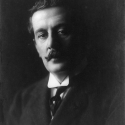
|
Giacomo PucciniComposer |
Giacomo Puccini, in full Giacomo Antonio Domenico Michele Secondo Maria Puccini, (born December 22, 1858, Lucca, Tuscany [Italy]—died November 29, 1924, Brussels, Belgium), Italian composer, one of the greatest exponents of operatic realism, who virtually brought the history of Italian opera to an end. His mature operas included La Bohème (1896), Tosca (1900), Madama Butterfly (1904), and Turandot (left incomplete).
Puccini was the last descendant of a family that for two centuries had provided the musical directors of the Cathedral of San Martino in Lucca. Puccini initially dedicated himself to music, therefore, not as a personal vocation but as a family profession. He was orphaned at the age of five by the death of his father, and the municipality of Lucca supported the family with a small pension and kept the position of cathedral organist open for Giacomo until he came of age. He first studied music with two of his father’s former pupils, and he played the organ in small local churches. A performance of Giuseppe Verdi’s Aida, which he saw in Pisa in 1876, convinced him that his true vocation was opera. In the autumn of 1880 he went to study at the Milan Conservatory, where his principal teachers were Antonio Bazzini, a famous violinist and composer of chamber music, and Amilcare Ponchielli, the composer of the opera La gioconda. On July 16, 1883, he received his diploma and presented as his graduation composition Capriccio sinfonico, an instrumental work that attracted the attention of influential musical circles in Milan. In the same year, he entered Le villi in a competition for one-act operas. The judges did not think Le villi worthy of consideration, but a group of friends, led by the composer-librettist Arrigo Boito, subsidized its production, and its premiere took place with immense success at Milan’s Verme Theatre on May 31, 1884. Le villi was remarkable for its dramatic power, its operatic melody, and, revealing the influence of Richard Wagner’s works, the important role played by the orchestra. The music publisher Giulio Ricordi immediately acquired the copyright, with the stipulation that the opera be expanded to two acts. He also commissioned Puccini to write a new opera for La Scala and gave him a monthly stipend: thus began Puccini’s lifelong association with Giulio Ricordi, who was to become a staunch friend and counselor.
After the death of his mother, Puccini fled from Lucca with a married woman, Elvira Gemignani. Finding in their passion the courage to defy the truly enormous scandal generated by their illegal union, they lived at first in Monza, near Milan, where a son, Antonio, was born. In 1890 they moved to Milan, and in 1891 to Torre del Lago, a fishing village on Lake Massaciuccoli in Tuscany. This home was to become Puccini’s refuge from life, and he remained there until three years before his death, when he moved to Viareggio. But living with Elvira proved difficult. Tempestuous rather than compliant, she was justifiably jealous and was not an ideal companion. The two were finally able to marry in 1904, after the death of Elvira’s husband. Puccini’s second opera, Edgar, based on a verse drama by the French writer Alfred de Musset, had been performed at La Scala in 1889, and it was a failure. Nevertheless, Ricordi continued to have faith in his protégé and sent him to Bayreuth in Germany to hear Wagner’s Die Meistersinger.
Puccini returned from Bayreuth with the plan for Manon Lescaut, based, like the Manon of the French composer Jules Massenet, on the celebrated 18th-century novel by the Abbé Prévost. Beginning with this opera, Puccini carefully selected the subjects for his operas and spent considerable time on the preparation of the librettos. The psychology of the heroine in Manon Lescaut, as in succeeding works, dominates the dramatic nature of Puccini’s operas. Puccini, in sympathy with his public, was writing to move them so as to assure his success. The score of Manon Lescaut, dramatically alive, prefigures the operatic refinements achieved in his mature operas: La Bohème, Tosca, Madama Butterfly, and La fanciulla del west (1910; The Girl of the Golden West). These four mature works also tell a moving love story, one that centres entirely on the feminine protagonist and ends in a tragic resolution. All four speak the same refined and limpid musical language of the orchestra that creates the subtle play of thematic reminiscences. The music always emerges from the words, indissolubly bound to their meaning and to the images they evoke. In Bohème, Tosca, and Butterfly, he collaborated enthusiastically with the writers Giuseppe Giacosa and Luigi Illica. The first performance (February 17, 1904) of Madama Butterfly was a fiasco, probably because the audience found the work too much like Puccini’s preceding operas.
In 1908, having spent the summer in Cairo, the Puccinis returned to Torre del Lago, and Giacomo devoted himself to Fanciulla. Elvira unexpectedly became jealous of Doria Manfredi, a young servant from the village who had been employed for several years by the Puccinis. She drove Doria from the house threatening to kill her. Subsequently, the servant girl poisoned herself, and her parents had the body examined by a physician, who declared her a virgin. The Manfredis brought charges against Elvira Puccini for persecution and calumny, creating one of the most famous scandals of the time. Elvira was found guilty, but through the negotiations of the lawyers was not sentenced, and Puccini paid damages to the Manfredis, who withdrew their accusations. Eventually the Puccinis adjusted themselves to a coexistence, but the composer from then on demanded absolute freedom of action.
The premiere of La fanciulla del west took place at the Metropolitan in New York City on December 10, 1910, with Arturo Toscanini conducting. It was a great triumph, and with it Puccini reached the end of his mature period. He admitted “writing an opera is difficult.” For one who had been the typical operatic representative of the turn of the century, he felt the new century advancing ruthlessly with problems no longer his own. He did not understand contemporary events, such as World War I. In 1917 at Monte-Carlo in Monaco, Puccini’s opera La rondine was first performed and then was quickly forgotten.
Always interested in contemporary operatic compositions, Puccini studied the works of Claude Debussy, Richard Strauss, Arnold Schoenberg, and Igor Stravinsky. From this study emerged Il trittico (The Triptych; New York City, 1918), three stylistically individual one-act operas—the melodramatic Il tabarro (The Cloak), the sentimental Suor Angelica, and the comic Gianni Schicchi. His last opera, based on the fable of Turandot as told in the play Turandot by the 18th-century Italian dramatist Carlo Gozzi, is the only Italian opera in the Impressionistic style. Puccini did not complete Turandot, unable to write a final grand duet on the triumphant love between Turandot and Calaf. Suffering from cancer of the throat, he was ordered to Brussels for surgery, and a few days afterward he died with the incomplete score of Turandot in his hands.
Turandot was performed posthumously at La Scala on April 25, 1926, and Arturo Toscanini, who conducted the performance, concluded the opera at the point Puccini had reached before dying. Two final scenes were completed by Franco Alfano from Puccini’s sketches.
Solemn funeral services were held for Puccini at La Scala in Milan, and his body was taken to Torre del Lago, which became the Puccini Pantheon. Shortly afterward, Elvira and Antonio were also buried there. The Puccini house became a museum and an archive.
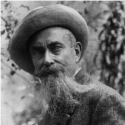
|
Luigi IllicaLibrettist |
Luigi Illica (1857 – 1919) was an Italian librettist who wrote for Giacomo Puccini (usually with Giuseppe Giacosa), Pietro Mascagni, Alfredo Catalani, Umberto Giordano, Baron Alberto Franchetti and other important Italian composers. His most famous opera libretti are those for La Bohème, Tosca, Madama Butterfly and Andrea Chénier.
Illica was born at Castell'Arquato. His personal life sometimes imitated his libretti. The reason he is always photographed with his head slightly turned is because he lost his right ear in a duel over a woman. When silent films based on Illica's operas were made, his name appeared in large letters on advertisements because distributors could only guarantee that his stories would be used, and not that they would be accompanied by the music of the appropriate composer.
As a playwright of considerable quality, he is today remembered through one of Italy's oldest awards, the Luigi Illica International Prize founded in 1961, which goes to world famous opera singers, opera conductors, directors and authors. The Award is now awarded every two years and alternates with the Illica Opera Stage International Competition, which offers prizes and debut opportunities to young singers.
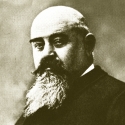
|
Giuseppe GiacosaLibrettist |
Giuseppe Giacosa (1847 – 1906) was an Italian poet, playwright and librettist. He was born in Colleretto Parella, now Colleretto Giacosa, near Turin. His father was a magistrate. Giuseppe went to the University of Turin, studying in the University of Turin, Faculty of Law. Though he gained a degree in law, he did not pursue a legal career.
He gained initial fame for his play Una Partita a Scacchi ("A Game of Chess") in 1871. His main field was playwriting, which he accomplished with both insight and simplicity, using subjects set in Piedmont and themes addressing contemporary bourgeois values. He wrote La signora di Challant (La Dame de Challant, The Lady of Challand), based on a novella by Matteo Bandello, for noted French actress Sarah Bernhardt, produced in New York in 1891.
Giacosa wrote the final polished version of the libretto for Giacomo Puccini's Manon Lescaut, which had been begun by Ruggero Leoncavallo, Marco Praga, Domenico Oliva, and Luigi Illica. He also wrote the librettos used by Puccini for La Bohème, Tosca and Madama Butterfly in conjunction with Luigi Illica. Illica supplied the plot and dialogue, and Giacosa polished the libretto into verses.




